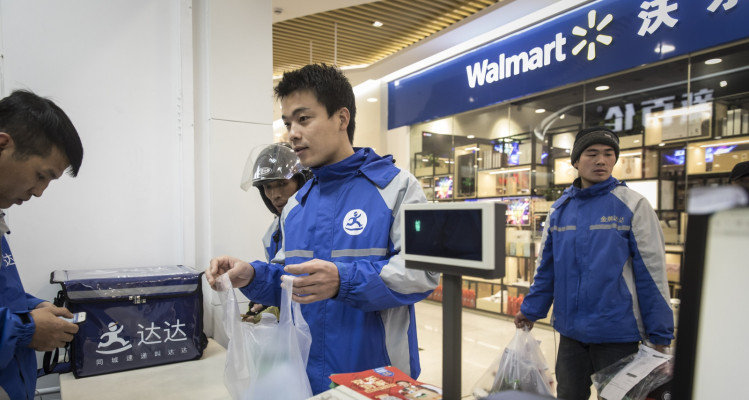Walmart sold its China-based e-commerce business in 2016, but the U.S. retail giant is very much involved in the Chinese internet market through a partnership with e-commerce firm JD.com. Alibaba’s most serious rival, JD scooped up Walmart’s Yihaodian business and offered its own online retail platform to help enable Walmart to products in China, both on and offline.
Now that relationship is developing further after Walmart and JD jointly invested $500 million into Dada-JD Daojia, an online-to-offline grocery business which is part owned by JD, according to a CNBC report.
Unlike most grocery delivery services, though, Dada-JD Daojia stands apart because it includes a crowdsourced element.
The business was formed following a merger between JD Daojia, JD’s platform for order from supermarkets online which has 20 million monthly users, and Daojia, which uses crowdsourcing to fulfill deliveries and counts 10 million daily deliveries. JD Daojia claims over 100,000 retail stores and its signature is one-hour deliveries for a range of products, which include fruit, vegetables and groceries.
Walmart is already part of the service — it has 200 stores across 30 Chinese cities on the Dada-JD Daojia service; as well as five online stores on the core JD.com platform — and now it is getting into the business itself via this investment.
JD.com said the deal is part of its ‘Borderless Retail’ strategy, which includes staff-less stores and retail outlets that mix e-commerce with physical sales.
“The future of global retail is boundaryless. There will be no separation between online and offline shopping, only greater convenience, quality and selection to consumers. JD was an early investor in Dada-JD Daojia, and continues its support, because we believe that its innovations will be an important part of realizing that vision,” said Jianwen Liao, Chief Strategy Officer of JD.com, in a statement.
Alibaba, of course, has a similar hybrid strategy with its Hema stores and food delivery service Ele.me, all of which links up with its Taobao and T-Mall online shopping platforms. The company recently scored a major coup when it landed a tie-in with Starbucks, which is looking to rediscover growth in China through an alliance that will see Ele.me deliver coffee to customers and make use of Hema stores.
Away from the new retail experience, JD.com has been doing more to expand its overseas presence lately.
The company landed a $550 million investment from Google this summer which will see the duo team up to offer JD.com products for sale on the Google Shopping platform across the world. Separately, JD.com has voiced intention to expand into Europe, starting in Germany, and that’s where the Google deal and a relationship with Walmart could be hugely helpful.
Another strategic JD investor is Tencent, and that relationship has helped the e-commerce firm sell direct to customers through Tencent’s WeChat app, which is China’s most popular messaging service. Tencent and JD have co-invested in a range of companies in China, such as discount marketplace Vipshop and retail group Better Life. Their collaboration has also extended to Southeast Asia, where they are both investors in ride-hailing unicorn Go-Jek, which is aiming to rival Grab, the startup that bought out Uber’s local business.










